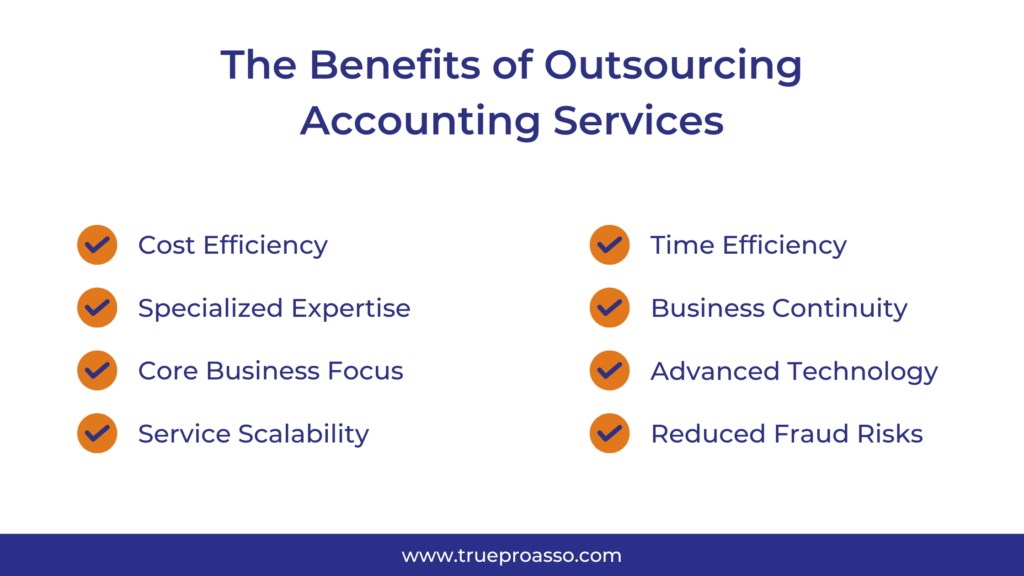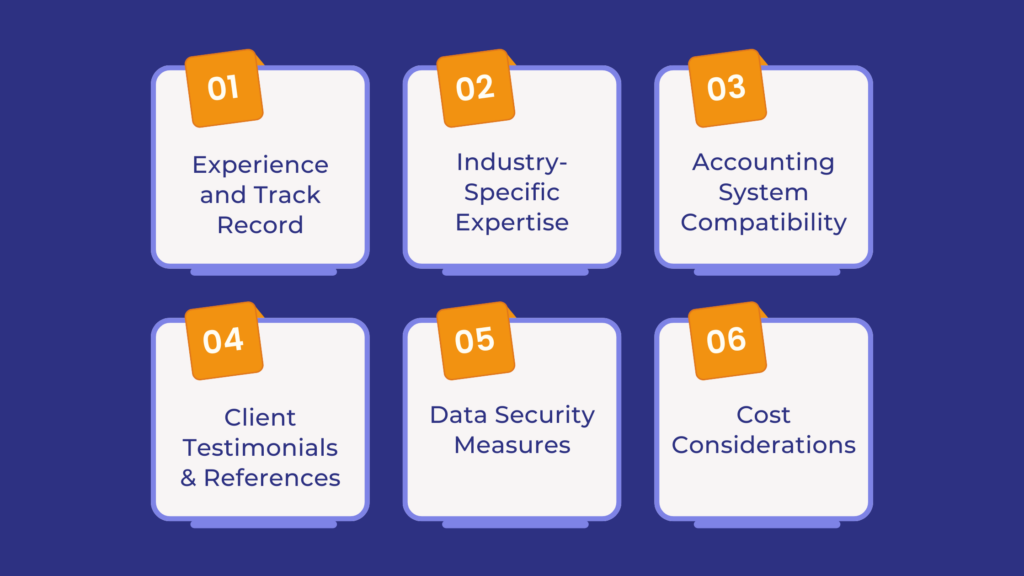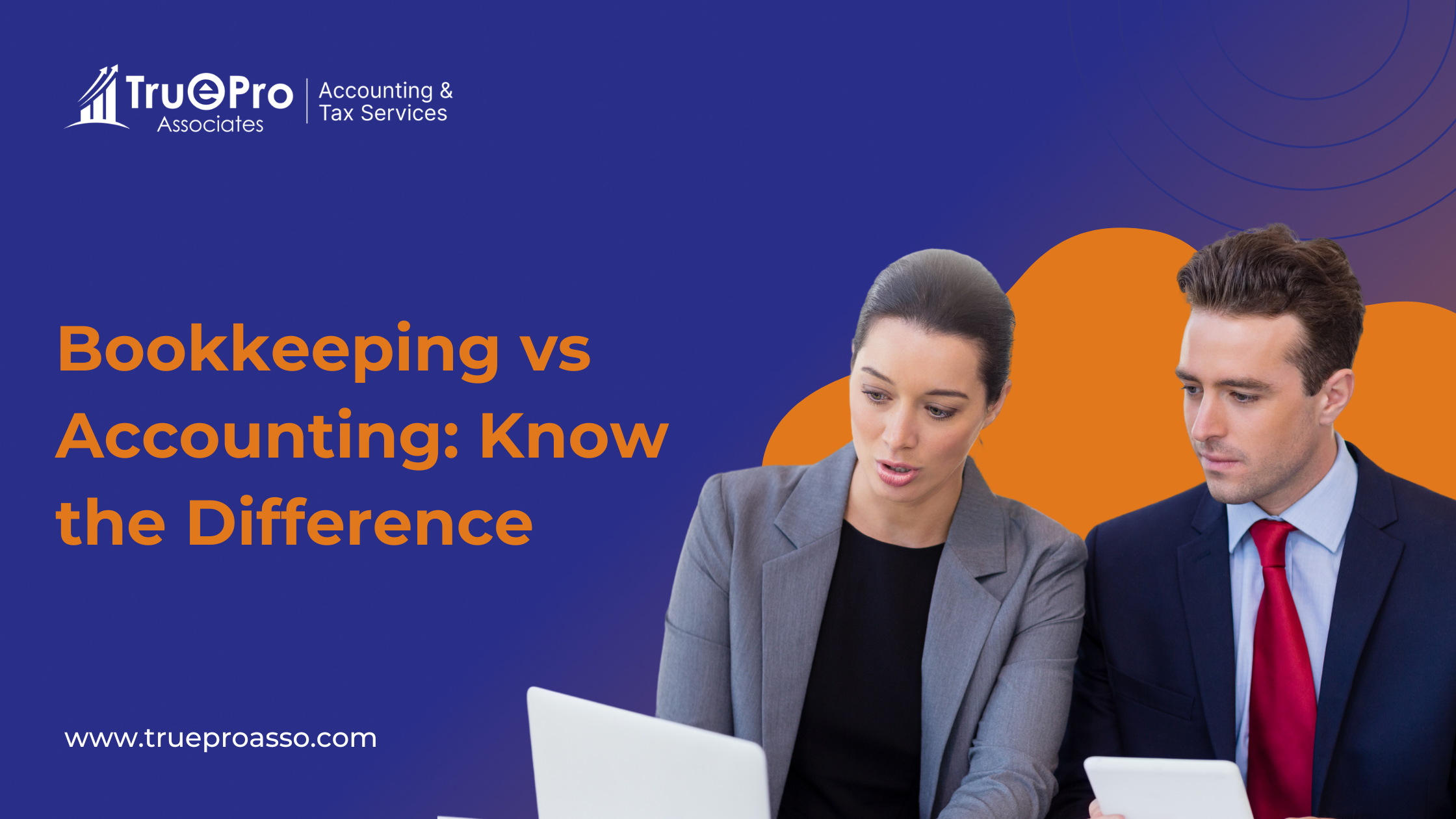Running a business involves numerous responsibilities, and managing your finances effectively is crucial to success. Outsourcing your accounting functions can be a strategic move, ensuring your financial records are professionally maintained. This allows you to concentrate on innovation and growth, confident that your financial operations are in expert hands.
Outsourcing accounting services can offer significant financial advantages for your business. While maintaining a full-time, in-house financial team can be expensive, turning to outsourced accounting services might be the cost-effective solution you need, as it helps save money and supports long-term financial objectives and everyday operations.
Statistics show that 37% of companies prioritize outsourcing their accounting and financial services to boost efficiency and reduce expenses. However, the benefits of outsourcing extend beyond saving time and money, as they also enhance the overall management of finance and accounting tasks.
In this blog, we’ll explore the benefits of outsourced accounting services and offer insights on how this can boost your business’s success.
What Does Outsourced Accounting Mean?
Outsourced accounting means engaging a third-party organization to handle your business’s financial matters, eliminating the need for an in-house accounting team. This service could be provided by a specialized accounting firm or an independent contractor who takes on various financial responsibilities. Here’s a look at the common types of accounting services that businesses often outsource:
- Bookkeeping: Records daily income and expense transactions, typically managed by entry-level bookkeepers.
- Monthly Accounting: This involves closing the books monthly and providing financial health insights, performed by professional accountants.
- Cash Flow Forecasting: Analyzes cash inflows and outflows to forecast future financial positions, handled by experienced accountants.
- Operational Support: Enhances financial operation efficiency through process improvements and advanced technology provided by financial consultants.
Outsourced accounting firms often offer services in customizable packages, allowing businesses to select the specific services that meet their needs. This model does not necessarily mean working with overseas firms; it involves engaging external professionals to handle financial operations, ensure compliance, and manage accounts efficiently.
The Benefits of Outsourcing Accounting Services

Outsourcing accounting services helps streamline financial operations and provides access to specialized expertise, allowing companies to focus more on their core activities and strategic growth. Here is a list of some of the advantages of outsourcing accounting services :
1. Cost Efficiency
Outsourcing bookkeeping and accounting reduces the financial burden of maintaining an in-house accounting department. It eliminates the need for hiring, onboarding, and providing benefits and insurance to a team of accountants, which can substantially increase operating expenses. This shift allows businesses.
- To redirect resources from non-core activities, such as managing payroll and reconciling accounts, to areas directly contributing to revenue generation, such as sales and business development.
- With the savings gained from outsourcing, you can invest in hiring skilled personnel for critical business functions, further enhancing your company’s growth and reach.
2. Specialized Expertise
Another important advantage of outsourcing accounting services is that it gives your business access to accounting professionals with a wealth of experience and specialized knowledge.
- These professionals are adept at managing complex accounting tasks precisely and efficiently, ensuring the expert handling of your financial operations.
- This level of expertise is especially valuable as it comes without the overhead costs associated with recruiting, training, and maintaining an in-house accounting team. Outsourced accountants often work across various industries, gaining broad insights that can translate into better service for your business.
3. Core Business Focus
As a business owner considering outsourcing finance and accounting services, you might have several pertinent questions about this strategic move. Here’s a list of questions you might consider:
- How will outsourcing finance and accounting services impact my control over financial decisions and the confidentiality of data?
- How can outsourcing help in scaling my business operations up or down?
- What is the credibility and track record of the potential outsourcing partners?
- Can the outsourced firm adapt to my business’s specific needs and preferences?
Outsourcing your accounting services can significantly free up your internal resources, enabling you to focus more intently on your primary business activities. This shift in resource allocation means you can dedicate more time and effort to strategic pursuits such as expanding your business, enhancing your products, and penetrating new markets.
4. Service Scalability
One significant advantage of outsourcing accounting services is their ability to scale with your business. As your company grows or faces seasonal fluctuations, these firms can adjust their services to meet your changing needs.
- Experienced outsourced accounting firms know when to expand or reduce services based on their client’s operational demands. This strategic scaling is crucial during periods of rapid growth or downturns, ensuring that you only pay for what you need.
- Outsourced accounting firms often provide flexible contracts to accommodate your business model’s unique aspects. This approach means you are not locked into long-term agreements that don’t reflect your current needs. The sliding pay scales and adaptable service offerings enhance your company’s operational independence, allowing for financial agility without the burden of fixed overhead costs.
5. Time Efficiency
Outsourcing your accounting functions can significantly free up your team’s time, allowing them to focus more on strategic business areas. Here’s how delegating these financial tasks can benefit your business:
- Outsourcing routine financial tasks like payroll processing and debt management enables your in-house team to concentrate on your business’s core functions.
- Your team can invest more energy in exploring new markets, refining business strategies, and enhancing customer engagement.
- Your team can prioritize projects and initiatives directly contributing to business growth and customer satisfaction.
By outsourcing accounting responsibilities, your business can optimize operational efficiency and focus on areas with the greatest return on investment.
6. Business Continuity
Outsourcing your accounting functions to a specialized firm can greatly enhance your business’s continuity, especially during disruptions. Here’s how this benefit plays out:
- Relying on an outsourced team helps safeguard against disruptions caused by human capital shortages, such as staff illnesses or resignations, as outsourced firms have a larger pool of skilled accountants.
- You can enhance reliability by incorporating a business continuity plan into your outsourcing provider’s service agreement. This ensures that they are contractually obligated to maintain timely services, thus protecting your business against financial mishaps like delayed payments or penalties due to late tax submissions.
7. Advanced Technology
Outsourcing your finance and accounting (F&A) functions allows your business to benefit from the latest technological advancements without the substantial investment required to implement these systems internally. Here’s how this can significantly benefit your operations:
- Outsourced accounting firms invest in advanced technology and cloud-based systems. This gives your business access to top-tier accounting software and automation tools that enhance the efficiency and accuracy of financial processes.
- Automation in accounting software minimizes human errors and reduces the risk of internal fraud.
- Automated systems ensure that your financial data is processed accurately, enhancing the overall reliability of your financial reports.
- These advanced technologies enable real-time financial reporting, which is crucial for timely decision-making.
8. Reduced Fraud Risks
Outsourcing your finance and accounting (F&A) tasks can significantly reduce the risk of internal fraud and theft that businesses, especially small ones, often face. Here’s how outsourcing helps mitigate these risks:
- Automated accounting software used by outsourcing firms reduces human errors, which can lead to discrepancies and potential fraud.
- Small businesses are particularly vulnerable to theft by employees. Outsourcing accounting services for small businesses introduces an independent party to monitor your finances, adding security and impartiality.
- Outsourced accounting firms conduct thorough audits and maintain a robust system of checks and balances, safeguarding your business against fraudulent activities.
- These experts stay current with the latest tax laws and accounting standards, ensuring your business adheres to regulations and avoids penalties.
Comparison of Outsourcing Accounting Services vs. In-House Accounting Team
Here is a comparison between outsourcing accounting services and maintaining an in-house accounting team, highlighting the pros and cons of each option to help businesses make informed decisions.
| Criteria | Outsourced Accounting Partner | In-House Accounting Team |
| Cost Efficiency | Pro: Often more cost-effective due to reduced overhead costs. | Con: Higher costs due to salaries, benefits, and other employment expenses. |
| Expertise and Technology | Pro: Access to experts with knowledge of the latest accounting technologies and practices. | Con: Limited to the expertise of the employed staff, potential additional costs for training and technology upgrades. |
| Scalability | Pro: Easily scalable services for business growth or downsizing without HR constraints. | Con: Scaling up requires hiring more staff; scaling down might involve layoffs. |
| Focus on Core Business | Pro: Frees up internal resources to focus on core business activities. | Con: Resources may be stretched thin, especially in smaller teams handling multiple roles. |
| Security and Compliance | Pro: Typically have robust security measures and stay updated on compliance standards. | Con: Risk of data breaches or non-compliance if not managed properly. |
| Control and Communication | Con: Potential challenges in communication and control over financial operations. | Pro: Direct control over tasks and easier communication with team members. |
| Long-Term Relationship | Con: Less personal connection, as the service provider may change personnel or policies. | Pro: Builds a stable, long-term team environment and company culture. |
How to Choose an Effective Outsourced Accounting Partner?

Selecting the right partner when considering outsourced accounting services is crucial for your business. We have outlined the main factors to consider and explain when it might be appropriate for your business to outsource these services.
- Experience and Track Record: Opt for a partner with extensive experience in accounting outsourcing. A partner with a proven track record will likely handle your financial functions more effectively and can provide references or case studies to demonstrate their capability.
- Industry-Specific Expertise: Ensure the outsourcing partner has expertise in your specific industry. Unique accounting challenges and regulations in your sector require specialized knowledge for optimal financial management.
- Accounting System Compatibility: Confirm that the outsourcing firm is proficient with your business’s accounting software. This ensures they can integrate smoothly and work efficiently with your existing systems.
- Client Testimonials and References: Reviews and testimonials from current and past clients can give insights into the provider’s reliability and quality of service. Speaking directly to their clients can also offer a deeper understanding of their satisfaction levels.
- Data Security Measures: Since financial data is sensitive, check the outsourced provider’s security protocols, such as encryption and access controls, and compliance with relevant data protection laws.
- Cost Considerations: Understand the full cost implications of their services. Discuss all fees, potential hidden costs, and what exactly is included in the price to avoid surprises.
When Should You Consider Outsourcing Accounting Services?
Here are some reasons to consider outsourcing your accounting needs:
- Scaling Operations: You are scaling your operations and need more robust financial management that your current team cannot provide.
- Access to Technology: You want access to the latest accounting technology without the hefty investment in software and training.
- Cost Reduction: You aim to reduce operational costs by eliminating the need for in-house accounting staff and associated expenses like salaries and benefits.
- Resource Allocation: You must free up your internal resources to focus on core business activities and strategic growth rather than day-to-day financial management.
- Enhanced Security: You require stringent security and compliance measures that an outsourced expert can better provide.
Outsourcing accounting functions can be a strategic move for businesses looking to optimize their financial operations and focus more on core business growth. Choosing the right partner is essential to achieving these objectives effectively.
Streamline Your Accounting Needs with TruePro Associates

At TruePro Associates, we offer comprehensive accounting services tailored to meet your unique business needs.
Why Choose TruePro Associates?
- Expertise You Can Trust: Our experienced accountants are well-versed in the latest industry practices.
- Customized Solutions: We take the time to understand your specific circumstances and tailor our accounting services accordingly.
- Transparent Pricing: We discuss our fees upfront, ensuring you understand the value of the services you receive.
Schedule a consultation and learn how we can assist you in achieving your accounting and financial goals.
Contact us today!
FAQ
Q1. Is it better to outsource accounting?
Ans. Outsourcing accounting can be beneficial, especially for startups and small businesses that may not have the resources to support a full-time accounting department. Outsourced accounting for startups offers access to expert services at a lower cost than hiring full-time staff. This can free up resources to focus on core business activities.
Q2. When to outsource accounting?
Ans. Businesses often outsource accounting when they need to scale their operations quickly, reduce overhead costs, or improve financial accuracy and compliance. If the cost of outsourcing accounting services is lower than maintaining an in-house team or specialized expertise is required, it might be the right time to consider accounting outsourcing services.
Q3. What are outsourcing’s advantages and disadvantages?
Ans. Advantages: Outsourcing can provide financial benefits by reducing labor costs and overhead, accessing specialized expertise, and improving business focus. Finance and accounting outsourcing companies often bring advanced technology and processes that improve efficiency and compliance.
Disadvantages: Potential downsides include less control over the financial processes, risks related to privacy and security, and possible issues with service continuity and quality depending on the provider.
Q4. What is the best way to outsource?
Ans. The best way to outsource involves carefully selecting reliable accounting outsourcing companies based on their track record, security measures, and client reviews. It’s important to define clear terms in the service agreement, understand the full cost of outsourcing accounting services, and ensure they have experience relevant to your industry.
Establishing strong communication channels and setting clear expectations are also crucial steps.
For businesses considering outsourcing, aligning with reputable finance and accounting outsourcing companies can enhance their operational efficiency and financial management without the overhead associated with an in-house team.







